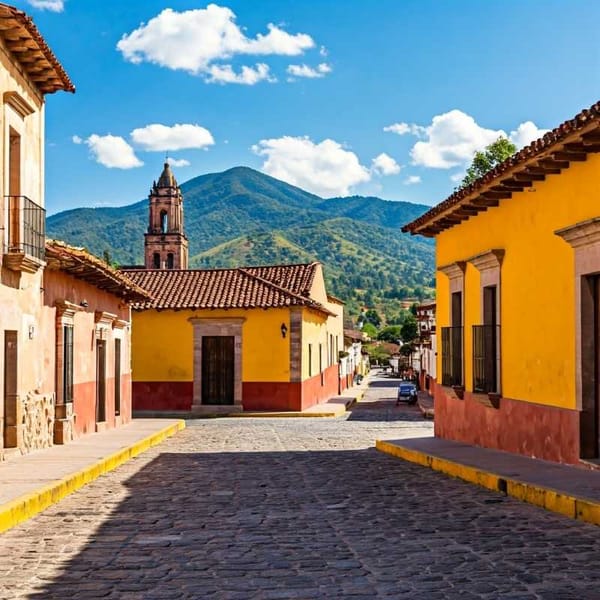AMLO Confronts Corruption and Exposes Misinformation
In the tumultuous world of Mexican politics, AMLO faces off against accusations of corruption, exposes a shadowy smear campaign, condemns draconian laws in Texas, and navigates censorship challenges from the INE. Amidst the chaos, the resilience of Mexico's political institutions is put to the test.

It all started when Salinas Pliego, a titan in the Mexican business world, pointed a finger at alleged corruption within the government of Mexico. His accusations pierced the air like a lightning bolt, sparking a storm of controversy that reverberated through the halls of power. But AMLO, known for his unwavering commitment to transparency and accountability, wasted no time in responding to the challenge laid down by Salinas Pliego.
“We made a commitment not to lie, not to steal, and not to betray the people,” declared López Obrador, his words echoing with the weight of his presidency. With a call for evidence, he invited Salinas Pliego to bring forth his allegations, daring him to substantiate his claims. It was a showdown of epic proportions, a clash between two formidable figures, each wielding their own arsenal of influence and authority.
And so, the stage was set for a battle of evidence, as the gears of government machinery whirred into action. Arturo Medina, Undersecretary of the Interior, Antonio Martínez Dagnino, head of the Tax Administration Service (SAT), and Grisel Gallardo García, Fiscal Attorney of the Federation, took center stage, presenting a meticulous account of Salinas Pliego's tax trials.
Martínez Dagnino, with the precision of a surgeon, dissected the details, revealing the staggering extent of Salinas Pliego's outstanding debts. A whopping 63 billion pesos, a figure that seemed to defy comprehension, owed due to 7 cases of fiscal consolidation. The numbers painted a vivid picture of financial intricacy, a web of obligations interspersed with threads of obligation and accountability.
But amidst the numbers and legal jargon, one truth emerged with crystal clarity – the commitment of the government to transparency and honesty. By uploading all evidence to a government page, accessible to accountants and lawyers alike, AMLO's administration demonstrated a willingness to confront allegations head-on, without fear or favor.
Yet, beneath the surface, questions lingered. What drove Salinas Pliego to speak out? Was it a genuine concern for the welfare of the nation, or a strategic move in a larger game of power and influence? And what of AMLO, standing firm in the face of scrutiny, a beacon of integrity in a sea of uncertainty?
The Web of #NarcoPresidente
The digital battlefield is ablaze. Images of Mexico's President Andrés Manuel López Obrador are splashed with sinister labels. “#NarcoPresidente” screams from doctored photos and ominous video montages. This online blitzkrieg wasn't born organically; it's been meticulously manufactured, claims the Mexican government. And they're pointing fingers squarely at the state of Guanajuato.
Elizabeth García Vilchis, the no-nonsense government spokesperson in charge of combatting disinformation, has made bombshell accusations. In her weekly “Who's Who in Lies” segment, she alleges that Guanajuato has poured hundreds of thousands of pesos into financing the #NarcoPresidente campaign. The goal? To destabilize the presidency, spread fear, and undermine the nation's democratic foundations.
Vilchis doesn't just wave her hands. A meticulously crafted video presentation backs up her claims, weaving together a tale of social media manipulation. Facebook pages and anonymous profiles hum with orchestrated outrage – but Vilchis claims these accounts are far from genuine. She contends a vast network of bots and paid agitators inflate the campaign's reach and give a false impression of widespread public sentiment.
At the heart of these swirling accusations is a figure named Jesús Arturo Contla Cabrera. Branded as the mastermind behind an anonymous Facebook page called “El Amonestador” (“The Admonisher”), the government outs Contla Cabrera as a shadowy contractor for the Guanajuato government. They allege a trail of millions of pesos funneled his way, all with the clandestine aim of fueling the digital firestorm against the president.
The implications are enormous. A democratically elected president is, in essence, under digital siege. But why? Guanajuato, a stronghold of the conservative National Action Party (PAN), has long been a thorn in AMLO's side. This alleged digital campaign could be revenge for AMLO's repeated criticisms of Guanajuato's rampant violence and corruption. Could this be a political vendetta executed not with guns, but with hashtags and bots?
Or, could it be more insidious? AMLO, a populist figure who has amassed enormous power, has faced accusations of authoritarian leanings. Might this be an attempt, however clumsy, to portray him as willing to use his government machinery to crush legitimate opposition?
Beyond the political mudslinging, the #NarcoPresidente saga spotlights the dangers of a new kind of warfare. The ease of creating and spreading disinformation online creates a breeding ground for conspiracy and manipulation. Citizens find it harder than ever to distinguish fact from orchestrated fiction, fueling societal mistrust and polarization.
Whether Guanajuato truly bankrolled this attack on AMLO remains to be conclusively proven. Yet, as Vilchis and her team tear back the digital curtain, the unsettling truth emerges: political battles are no longer just fought on the streets and in the halls of power. Our social feeds have become the new battleground, where lies and truth collide with devastating real-world consequences.
AMLO's Stand Against Texas' SB4
As the specter of SB4 looms over the horizon, casting its shadow of fear and uncertainty, AMLO's voice rings out with clarity and conviction. Describing the law as draconian, he pulls no punches in denouncing its disregard for human dignity and the principles of Christian compassion. “We are against this draconian law that is completely opposite, contrary to human rights, a completely dehumanized law, anti-Christian, unjust,” declares López Obrador, his words echoing with the weight of moral authority.
But it is not merely the injustice of SB4 that stirs the ire of AMLO; it is the hypocrisy of those who champion its enforcement. With a pointed critique, he condemns the authorities who, in their zeal to uphold the law, betray the very teachings of the Bible they claim to follow. “Those who apply these unjust, inhuman measures, go to the temples, forget that the Bible talks about treating the stranger well and of course about love for your neighbor,” he admonishes, laying bare the hypocrisy that festers beneath the veneer of authority.
Yet, amidst the condemnation, there is a glimmer of hope, a resolve to confront injustice with courage and conviction. AMLO refuses to yield to the tyranny of SB4, vowing that Mexico will not stand idly by in the face of oppression. “We would rather not advance what we could do with the governor of Texas and anti-Mexicans,” he declares, his words a rallying cry for solidarity and resistance. “We would not accept deportations, once and for all, from the Government of Texas, and we are not going to stay with our arms crossed.”
Indeed, the battle against SB4 is far from over. With the weight of international law and diplomacy behind him, AMLO stands ready to challenge the legitimacy of this oppressive measure. “There will be a response from the Ministry of Foreign Affairs,” he assures, his tone resolute yet measured. “This issue is not defined, because one day the Federal Court of the United States says that the law does not apply and then that yeah.”
The Battle for Online Dominance
In the digital realm where tweets fly like arrows and YouTube videos serve as battlegrounds for political discourse, President Andrés Manuel López Obrador finds himself embroiled in a curious skirmish with the National Electoral Institute (INE). The latest episode in this saga unfolds with the INE's request for AMLO to take down a video of yet another Morning Conference, sparking a debate that transcends cyberspace and delves into the heart of freedom of expression.
As the news broke of the INE's demand, the air began to vibrate with tension, setting the stage for a showdown between two formidable forces. On one side stands AMLO, the charismatic leader known for his unfiltered and unapologetic approach to communication. On the other, the INE, tasked with safeguarding the integrity of Mexico's electoral process, wielding the authority of institutional oversight.
AMLO, ever the master of political theater, wasted no time in addressing the issue head-on. With a mixture of defiance and pragmatism, he revealed the notification from the INE, painting it as an act of provocation designed to stifle his message. “There was an act of provocation in the National Palace,” he declared, his words laced with disdain for what he perceives as censorship. Yet, true to form, he complied with the request, taking down the video “to the letter” before the INE could issue further directives.
But behind the veneer of compliance lies a deeper truth – the power of communication in shaping public opinion. AMLO, ever the astute strategist, understands the importance of social media and YouTube as tools for reaching the masses. “Even with this censorship, communication is important,” he asserts, his tone tinged with defiance. “Our adversaries may get angry, but they cannot ignore it.”
And indeed, the Morning Conference – a daily ritual in which AMLO addresses the nation – has become a phenomenon unto itself, attracting both praise and criticism in equal measure. For supporters, it is a beacon of transparency and accessibility, a direct line to the highest office in the land. For detractors, it is a platform for propaganda and manipulation, a stage upon which AMLO wields his considerable influence with impunity.
Yet, amidst the clamor of opinions and accusations, one question looms large – where does freedom of expression end and electoral regulation begin? The INE, bound by duty to uphold the integrity of the electoral process, walks a fine line between oversight and censorship. Its request to remove the Morning Conference video speaks to a broader concern for fairness and impartiality in the digital age, where misinformation and manipulation run rampant.




